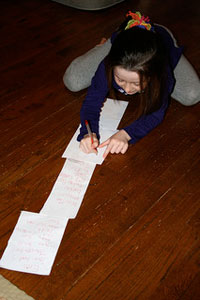
Source: making a list, tm22, Flickr
Learning to spell should be more systematic than memorizing ten words for Friday’s quiz. No doubt, your elementary teachers taught you how to spell by recognizing patterns in the language. English is made up of the following four basic kinds of words:
- Regular for reading and spelling (e.g., mat, sprint)
- Regular for reading but not for spelling (e.g., boat or rain, which could be spelled “bote” or “rane” )
- Rule-based words (e.g., planning, which uses the double-the-consonant rule; baking, which applies the drop-the-“e” rule)
- Irregular (e.g., beauty and doubt)
Most people find the irregular words in the fourth group the most challenging. For example, irregular words with a silent consonant baffle many spellers. Why does gnat start with a “g”? Why is there an “l” in calf? Why does doubt have a “b”? Watch Gina Cooke’s etymology lesson below, which sheds some light on the last word, doubt.
With a good explanation like that, you might begin to think that spelling isn’t as random as you thought. Still, there are doubtless other words whose spellings you will find perplexing. At least now, you will consider that there might be a reason for an irregular spelling, and you will remember how to spell “doubt.”
How do you spell “mnemonic”?
You have looked at a list of words that many people misspell and have identified the 10 that you find most challenging. What if you are someone who has mental blocks about spelling some words? That’s where memory devices or mnemonics come in. Take “absence,” the first word on the list found in the previous graphic organizer. If you are asking your teacher for an excused absence, you will want to spell that word accurately. What if you have trouble remembering if the end is spelled with an “s” or a “c”? You could associate the spelling with school by remembering that “students who have a lot of absences get Cs or worse.”
Look at the second word, “accommodate,” on the list in your graphic organizer. Does visualizing a double-car garage with two cars and two motorcyles help you remember to double the “c” and the “m” in accommodate?
For practice with mnemonics, see if you can match each word below with the reminder about how to spell it. Drag and drop each word from the box on the right into the circle beside the correct description on the left.


Source: Korrektúra, KovacsUr, Wikimedia
Now that you have a sense of how mnemonics can zero in on the tricky part of the word, look back at the list of “200 Most Commonly Misspelled Words in English” that appear on your graphic organizer and create your own mnemonic for one of the words. Select a word you might be inclined to use more often in your writing if you were not worried about spelling it incorrectly. Add the word and the mnemonic to your list.